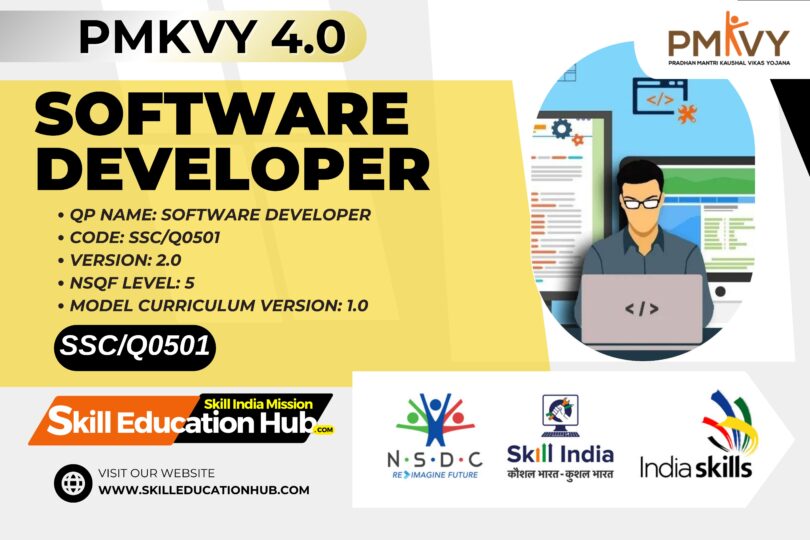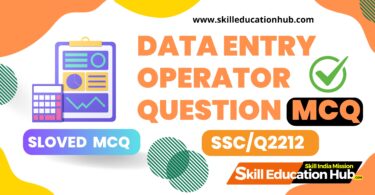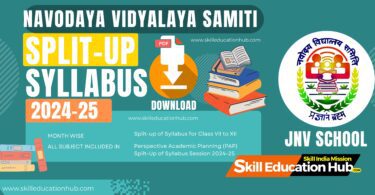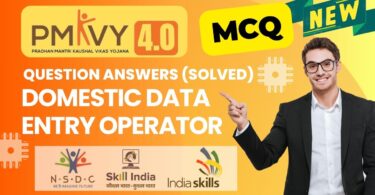Aligned with the demands of the industry, the PMKVY Course in Software Developer equips aspiring professionals with the essential skills and knowledge required to excel in the field of Application Development. Grounded in the principles of the National Skills Qualifications Framework (NSQF), this course encompasses a comprehensive curriculum that covers programming languages, software development methodologies, and industry best practices.
The PMKVY Course in Software Development stands as a gateway to a world of opportunities, empowering individuals to embark on a fulfilling career journey in the realm of Application Development. By imparting industry-relevant skills and fostering a culture of continuous learning, it not only enhances employability but also fuels the engine of innovation and economic growth. As participants emerge equipped with the tools of the trade, they become architects of the digital future, shaping a world where technology serves as a catalyst for progress and prosperity.

The PMKVY Course in Software Development delves into a myriad of key learning areas essential for Application Development:
Minimum Duration of the Course 500 hours (Includes 100 hours of OJT)
Maximum Duration of the Course 500 hours (Includes 100 hours of OJT)
- Programming Languages: Participants gain proficiency in popular programming languages such as Java, Python, or C++, mastering the syntax and semantics necessary for software development.
- Software Development Lifecycle: They learn about the various phases of the software development lifecycle, from requirements gathering and analysis to design, implementation, testing, and maintenance.
- Database Management: Understanding the fundamentals of database management systems (DBMS) and SQL (Structured Query Language) is crucial for developing data-driven applications.
- Web Development: Participants acquire skills in web development technologies such as HTML, CSS, and JavaScript, enabling them to build dynamic and interactive web applications.
- Mobile App Development: They delve into the nuances of mobile app development, exploring platforms like Android or iOS and learning to develop user-friendly and responsive mobile applications.
Upon successful completion of the PMKVY Course in Software Development, participants receive industry-recognized certification, validating their proficiency in Application Development. This certification serves as a testament to their skills and enhances their employability in the competitive job market.
Armed with the skills acquired through the PMKVY Course, individuals in Software Development are well-positioned to pursue a plethora of employment opportunities across various sectors. They can explore roles such as Software Developer, Web Developer, Mobile App Developer, or Software Engineer in IT companies, startups, e-commerce firms, and more.
In the fast-paced world of Information Technology (IT) and IT-enabled services (ITeS), the role of a Software Developer is both versatile and indispensable. Known by various titles such as Developer, Software Analyst, Software Engineer, Systems Engineer, Programmer, and Programmer Analyst, among others, these professionals are the architects of digital innovation, responsible for crafting software applications that drive efficiency and productivity across industries. Let’s delve into the intricacies of this multifaceted role, exploring its responsibilities, personal attributes, and significance within the IT-ITeS landscape.
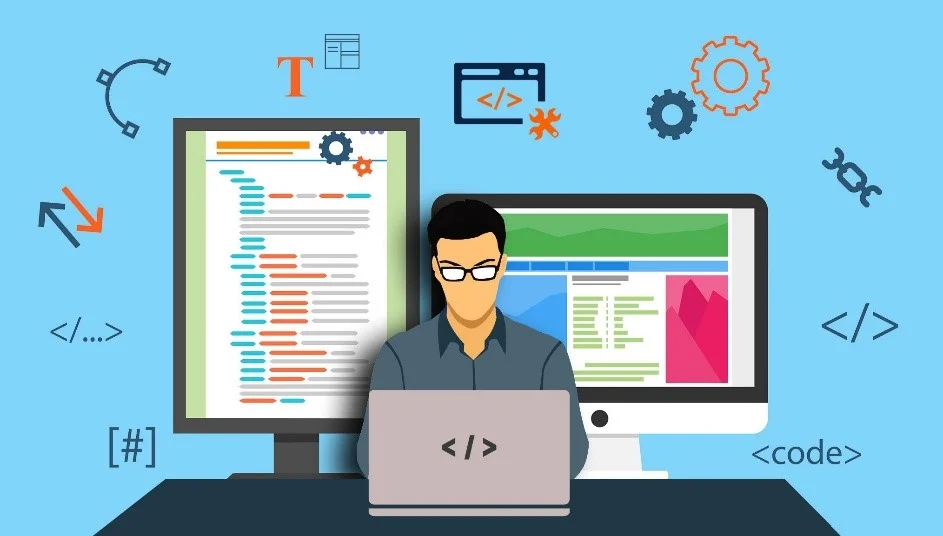
- Implement appropriate standards to assist in performing software construction as per
specifications. - Identify software development needs and changes.
- Design algorithms to solve problems and execute test cases to convert them into code.
- Evaluate the various software testing methodology and identify the correct one to deploy.
- Analyse software designs for already built products or services.
- Build data base skills including DBMS, data design for predevelopment process.
- Categorize between UML and Object-Oriented Design.
- Discuss about manual and automated testing of software components.
- Demonstrate application of suitable Unit Test Cases to validate the process of testing.
- Demonstrate effective communication and collaboration with colleagues.
- Apply measures to maintain standards of health and safety at the workplace.
- Use different approaches to effectively manage and share data and information.
- Develop strong relationships at the workplace through effective communication and conflict
management. - Identify best practices to maintain an inclusive, environmentally sustainable workplace
At its core, the role of a Software Developer revolves around the development of software applications and interfaces, as well as the enhancement of existing packaged applications or pre-engineered templates. These professionals are entrusted with the task of translating user requirements into functional and efficient software solutions, utilizing their expertise in programming languages, development frameworks, and best practices.
The responsibilities of a Software Developer encompass a wide array of tasks, including but not limited to:
- Software Development: Designing, coding, testing, and debugging software applications to ensure their functionality and reliability.
- Interface Development: Creating user interfaces that are intuitive, responsive, and user-friendly, enhancing the overall user experience.
- Enhancements: Implementing enhancements to existing applications to address evolving business needs and technological advancements.
- Support and Maintenance: Providing support for custom applications, troubleshooting issues, and performing regular maintenance to ensure optimal performance and stability.
- Documentation: Documenting software designs, development processes, and user manuals to facilitate seamless collaboration and knowledge transfer.

To excel in the role of a Software Developer, individuals must possess a diverse set of personal attributes, including:
- Independence: The ability to work independently, make decisions, and take ownership of projects without constant supervision.
- Result Orientation: A focus on delivering tangible results, meeting deadlines, and exceeding expectations to drive project success.
- Communication Skills: Effective communication skills, both verbal and written, to collaborate with team members, articulate ideas, and convey technical concepts to non-technical stakeholders.
- Logical Thinking: Strong analytical and problem-solving skills, coupled with a logical approach to dissecting complex issues and devising innovative solutions.
- Adaptability: Flexibility and adaptability to navigate evolving technologies, methodologies, and project requirements in a dynamic and ever-changing industry landscape.
In the IT-ITeS industry, Software Developers play a pivotal role in driving digital transformation and innovation. Their ability to conceptualize, develop, and deploy software solutions enables businesses to streamline operations, enhance customer experiences, and gain a competitive edge in the market. From e-commerce platforms and mobile applications to enterprise software systems, the contributions of Software Developers are instrumental in shaping the digital landscape and propelling organizations towards success.
Software Developer in the IT-ITeS industry is multifaceted, dynamic, and essential for driving technological advancement and business growth. With their technical expertise, personal attributes, and dedication to excellence, Software Developers serve as the backbone of digital innovation, empowering organizations to thrive in an increasingly digital-centric world.
The PMKVY (Pradhan Mantri Kaushal Vikas Yojana) Course for Software Developer in the IT-ITeS (Information Technology – IT-enabled Services) Industry is designed to equip individuals with the essential skills and knowledge required to excel in the dynamic and rapidly evolving field of software development. Tailored to meet the demands of the industry, this course encompasses a comprehensive curriculum that covers a wide range of topics essential for success in the IT-ITeS sector. Let’s delve into the module details of this transformative course:
Module 1: Introduction to Software Development
- Overview of software development lifecycle
- Understanding the role of a Software Developer in IT-ITeS industry
- Introduction to programming languages and development environments
Module 2: Programming Fundamentals
- Basics of programming logic and algorithm design
- Fundamentals of programming languages such as Python, Java, or C++
- Hands-on coding exercises to reinforce learning
Module 3: Web Development
- Introduction to web development technologies and frameworks
- HTML, CSS, and JavaScript fundamentals
- Building static and dynamic web pages
- Responsive web design principles
Module 4: Database Management
- Introduction to database management systems (DBMS)
- Fundamentals of relational databases and SQL (Structured Query Language)
- Database design and normalization
- Hands-on exercises on database creation, querying, and manipulation
Module 5: Software Development Tools and Technologies
- Overview of integrated development environments (IDEs) and version control systems
- Introduction to popular development frameworks and libraries
- Hands-on experience with tools like Git, Eclipse, Visual Studio, etc.
Module 6: Mobile App Development
- Introduction to mobile app development platforms (Android, iOS)
- Fundamentals of mobile app development frameworks (Flutter, React Native)
- Building and deploying mobile applications
- User interface design for mobile devices
Module 7: Software Testing and Quality Assurance
- Basics of software testing methodologies and techniques
- Introduction to automated testing tools and frameworks
- Importance of quality assurance in software development lifecycle
Module 8: Project Management and Documentation
- Principles of project management in software development
- Agile methodologies and scrum framework
- Documentation practices for software projects
- Communication and collaboration tools for project teams
Module 9: Industry Internship/On-the-Job Training
- Practical experience through industry internships or on-the-job training
- Application of learned skills in real-world software development projects
- Exposure to industry best practices and standards
- Mentoring and guidance from experienced professionals
Module 10: Certification and Assessment
- Evaluation of knowledge and skills acquired through assessments and examinations
- Industry-recognized certification upon successful completion of the course
- Validation of competency in software development for employment opportunities

